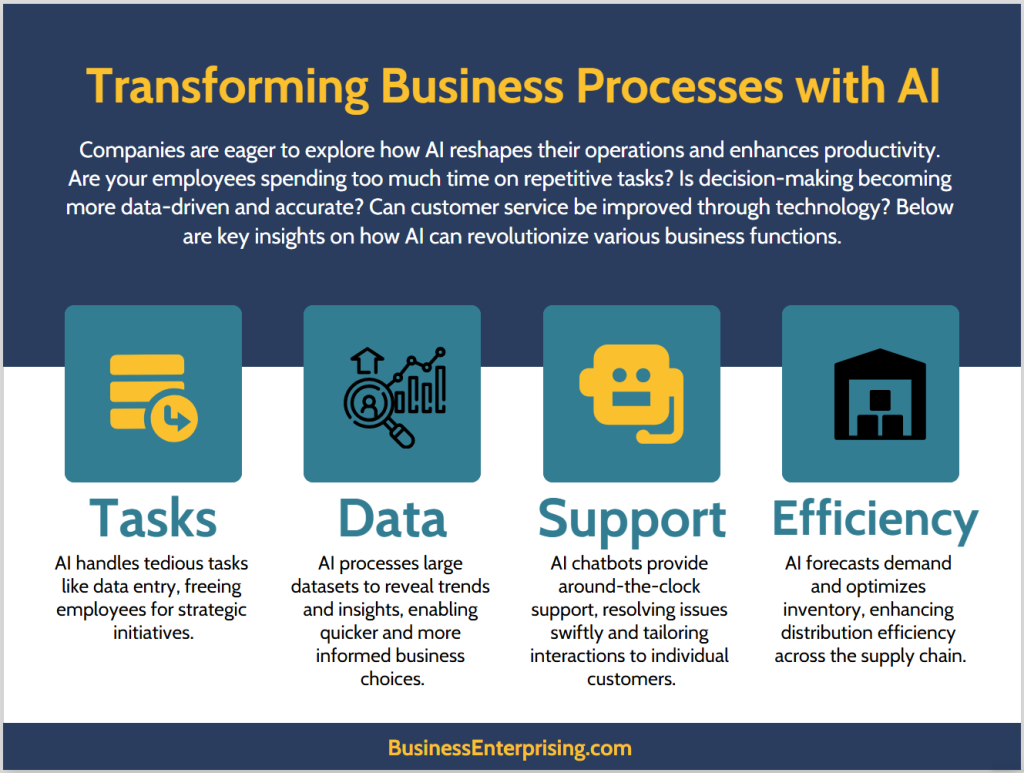 AI is revolutionizing the way businesses operate by introducing innovative tools and strategies that improve efficiency and decision-making. Understanding how AI transforms processes is essential for businesses looking to stay competitive and adapt to evolving demands. Additionally, AI enables you to automate repetitive tasks, analyze data, and enhance customer interactions in ways that were previously difficult.
AI is revolutionizing the way businesses operate by introducing innovative tools and strategies that improve efficiency and decision-making. Understanding how AI transforms processes is essential for businesses looking to stay competitive and adapt to evolving demands. Additionally, AI enables you to automate repetitive tasks, analyze data, and enhance customer interactions in ways that were previously difficult.
However, adopting AI requires thoughtful integration and a focus on ethical considerations. By addressing these challenges, you can maximize its benefits while minimizing risks. Whether it’s streamlining operations, improving forecasting, or detecting fraud, AI offers solutions that support long-term growth.
By exploring its applications and understanding its potential, you can make informed decisions about how AI fits into your business strategy. With the right approach, AI can help you achieve meaningful outcomes and transform your processes effectively.
Streamlining Workflow Automation with AI
AI is transforming how businesses handle repetitive tasks, making processes more efficient and freeing up valuable resources. By automating workflows, AI reduces manual effort and minimizes the risk of human error. This efficiency allows your team to focus on higher-value tasks that contribute to growth and innovation.
Additionally, AI tools can manage time-consuming processes like data entry, scheduling, and document organization. For instance, automated systems can process large datasets quickly, improving accuracy and consistency. With these capabilities, you can streamline operations and improve productivity without requiring additional staff or resources.
Another benefit is how AI transforms processes that require coordination across multiple departments. By integrating systems and automating communication, AI ensures that teams stay aligned and work flows smoothly. This seamless interaction reduces delays and enhances collaboration, leading to faster project completion.
When implemented thoughtfully, workflow automation with AI improves not only productivity but also employee satisfaction. By eliminating mundane tasks, your team can focus on meaningful work that drives results. These advantages illustrate how AI transforms processes and helps businesses achieve greater efficiency and success.
AI in Decision-Making and Predictive Analytics
AI plays a transformative role in decision-making by analyzing vast amounts of data to uncover patterns and trends. This ability allows you to make informed strategic choices based on reliable insights. By identifying correlations and predicting outcomes, AI ensures that decisions are driven by data, not guesswork.
Additionally, predictive analytics, powered by AI, helps you anticipate future scenarios with greater accuracy. For instance, AI can forecast market trends, customer behaviors, or inventory needs, enabling proactive planning. These insights provide a competitive edge by reducing uncertainty and supporting timely decisions.
Another way AI enhances decision-making is by delivering real-time updates and recommendations. Automated systems continuously analyze incoming data, ensuring you respond quickly to changes in your business environment. This flexibility highlights how AI transforms processes, especially in dynamic industries.
By integrating AI into your decision-making framework, you can align your strategies with actionable data and long-term goals. This approach not only improves outcomes but also builds confidence in your ability to adapt and grow.
Enhancing Customer Experience with AI Tools
AI tools are reshaping how businesses interact with their customers, providing faster and more personalized experiences. Chatbots, for example, offer immediate support, answering questions and resolving issues at any time. This convenience reduces wait times and ensures your customers feel valued and supported.
Additionally, AI-driven platforms analyze customer preferences to provide tailored recommendations. By understanding buying patterns and interests, these tools make suggestions that align with individual needs. This level of personalization builds trust and encourages loyalty, helping you foster long-term relationships with your audience.
AI also enhances customer service by automating routine tasks and streamlining support processes. Platforms powered by AI route inquiries to the right team members and provide agents with relevant customer insights. This efficiency highlights how AI transforms processes and improves satisfaction for both customers and your team.
When used effectively, AI tools create seamless and engaging interactions. They enable you to anticipate customer needs, respond quickly, and deliver a consistent experience. These benefits not only strengthen your brand but also contribute to meaningful and lasting customer connections.
Improving Supply Chain and Logistics Management
AI is revolutionizing supply chain and logistics management by offering tools to optimize inventory, forecast demand, and streamline distribution processes. By analyzing historical data and market trends, AI can accurately predict demand fluctuations. This helps you avoid stockouts or overstocking, ensuring better resource allocation and cost management.
Additionally, AI solutions improve inventory management by providing real-time tracking and automated replenishment systems. These tools monitor stock levels and trigger restocking orders when needed, minimizing waste and delays. This highlights how AI transforms processes, allowing you to operate more efficiently and with greater accuracy.
AI also streamlines distribution by optimizing delivery routes and schedules. Advanced algorithms identify the fastest and most cost-effective paths, reducing transportation costs and improving delivery times. This efficiency benefits your customers, who receive their orders promptly, and your business, which saves valuable time and resources.
When integrated into your operations, AI enhances visibility and decision-making across your supply chain. It enables you to respond quickly to disruptions, maintain efficiency, and meet customer expectations. These advantages make AI a powerful tool for managing the complexities of modern supply chains effectively.
AI for Financial Planning and Fraud Detection
AI is transforming financial planning by providing accurate budgeting and forecasting tools that streamline your processes. By analyzing historical data, AI generates forecasts that help you plan more effectively and allocate resources wisely. Additionally, real-time tracking allows you to monitor spending and adjust budgets as needed, improving your financial control.
Another significant benefit of AI is its ability to detect and prevent fraud. AI systems analyze patterns in transactions to identify unusual or suspicious activities. For example, they can flag anomalies in payment behavior or highlight inconsistencies in financial records. This proactive approach reduces the risk of fraudulent activities and protects your business from potential losses.
AI also supports smarter decision-making by providing insights that are both timely and actionable. By identifying trends and risks, AI enables you to adapt quickly to changing financial circumstances. This efficiency highlights how AI transforms processes, making them more accurate and secure.
When you integrate AI into your financial planning and fraud prevention strategies, you gain confidence in your operations. The ability to predict, plan, and protect gives you a stronger foundation for achieving your business goals. These tools not only save time but also help safeguard the integrity of your financial systems.
Challenges and Ethical Considerations of AI in Business
Adopting AI in business comes with unique challenges and ethical considerations that need careful attention. One common challenge is integrating AI systems into existing workflows. Compatibility issues and the need for training can slow the adoption process. Additionally, there may be resistance from employees concerned about job displacement or adapting to new technologies.
Ethical dilemmas also arise, particularly when AI processes sensitive data. Issues like privacy, bias, and accountability must be addressed to maintain trust. For example, if AI algorithms unintentionally favor certain groups, the results could lead to unfair practices. Therefore, it’s important to prioritize transparency and regularly evaluate how these systems operate.
Another limitation is the potential overreliance on AI decision-making without human oversight. While AI transforms processes by providing valuable insights, it can make errors or misinterpret data. Balancing automation with human judgment ensures decisions remain accurate and context-appropriate. Additionally, businesses must consider long-term implications, such as the environmental impact of energy-intensive AI systems.
By acknowledging these challenges, you can adopt AI in a way that supports ethical practices and long-term success. Proactively addressing these concerns ensures that AI contributes positively to your business while respecting employees, customers, and broader societal values.
Conclusion
AI is reshaping how businesses operate by introducing tools that simplify tasks, improve decision-making, and enhance customer experiences. However, adopting AI requires thoughtful planning to address challenges and ethical considerations. By understanding its limitations, you can implement solutions that are both effective and responsible.
Additionally, the ability to forecast trends, optimize processes, and safeguard operations shows how AI transforms processes in meaningful ways. Balancing automation with human oversight ensures your strategies remain adaptable and well-rounded. This combination of innovation and careful management supports sustainable success.
When used effectively, AI has the potential to improve efficiency and open new opportunities for your business. By integrating AI thoughtfully, you can drive positive change, make informed decisions, and create a more productive and innovative workplace.



